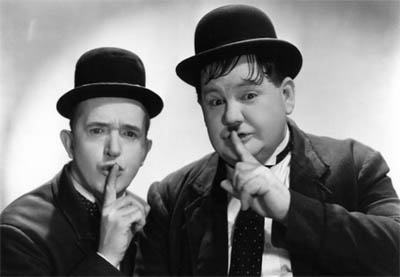
Randy Skretvedt's L&H biography takes great pains to point out the amount of personal pain that Stan and Babe were going through during the making of this film, and how none of it was reflected in the final, happy product. Here are some of the personal problems the duo endured during the film's shoot.
* Stan held up shooting for a couple of days when he was sick with the flu.
* According to sound engineer Ralph Butler, whenever Stan or Hal Roach was not present, Chill Wills was "a bully" on the set. Wills was also taken to task by production manager Sidney Van Keuren for using "salty vocabulary" around any ladies on the set.
* Stan Laurel's contract -- and only Stan's -- was up for renewal with Hal Roach. Until the team temporarily left Roach in 1939, Roach kept Laurel and Hardy on overlapping contracts -- so that each comedian's contract would expire in two years, but one year ahead of the other one. Roach freely admitted that this was one way for him to retain power over the duo.
* A week after shooting began, Stan and his wife Lois separated. Lois filed for separate maintenance. They divorced three months later.
* Stan's ex-vaudeville partner and common-law wife, Mae Laurel, sued Stan for $1,000/month separate maintenance. She eventually agreed to a settlement in return for no further legal action.
* Babe also had his share of marital woes. His estranged wife Myrtle sued him in November 1936 for $2,500/month separate maintenance. (Myrtle's attorney was the same as Ruth Laurel's.) Babe was granted a divorce from Myrtle six months later. Also in November of 1936, Babe's first wife Madelyn, whom he'd divorced in 1921, claimed she was due 15 years of back alimony.
Many of these personal and legal woes are not much different from some of L&H's similar endurances during other film shoots. (News stories of The Boys' ex-wives and alimonies often perplexed their producer Hal Roach, especially as he promoted himself as a purveyor of family entertainment.) L&H buffs should be grateful that any enjoyable entertainment came through, considering how upended their personal lives were until the mid-1940's.
(Click here to return to home page)